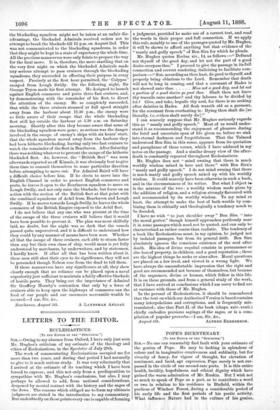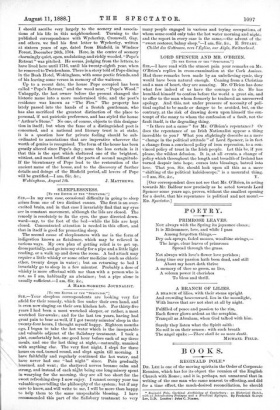POPE'S BICENTENARY.
[To THE EDITOR OF THE "SPECTATOR."]
SIR,—No one can reasonably find fault with your estimate of the genius of Pope. He may be lacking in splendour of colour and in imaginative creativeness and sublimity, but for• vivacity of fancy, for vigour of thought, for elevation of sentiment, and lucid, apt expression, Pope surely is not sur- passed in the circle of our second-rate poets. It is this entire health, lucidity, hopefulness, and ethical dignity which have gained the warm admiration of Mr. Ruskin. But I wish not so much to speak of Pope as a poet, as to contribute a word or two in relation to his residence in Binfield, within the purlieus of Windsor Forest, during a considerable period of his early life and the first periods of his poetic activity_ What influence Nature had in the culture of his genius,,
I should ascribe very largely to the scenery and associa- tions of his life in this neighbourhood. Turning to the published correspondence with Wycherley, Cromwell, Gay, and others, we find his first letter to Wycherley, written at sixteen years of age, dated from Binfield, in Windsor Forest, December 26th, 1704. Here, in the centre of scenery charmingly quiet, open, undulating, and richly wooded, "Pope's Retreat" was pitched. He seems, judging from the letters, to have lived here until 1716, until his twenty-eighth year, when he removed to Twickenham. There is a story told of Pope dining in the Bush Hotel, Wokingham, with some poetic friends, and of his leaving some verses in memory of the waitress.
Up to a recent date, the house Pope occupied has been called "Pope's Retreat," and the wood near, " Pope's Wood." Unhappily, the last owner before the present changed the historic name into a more modernised title, and the poet's residence was known as " The Firs." The property has lately passed into the hands of a Scotch gentleman, who has also sacrificed the greatest distinction of the place to personal, if not patriotic preference, and has styled the house "Arthur's Stone." No one, of course, objects to this designa- tion in itself ; but when the fame of a distinguished poet is concerned, and a national and literary trust is at stake, it is a question how far private feeling should be sub- ordinated to associations that are imperative wherever the worth of genius is recognised. The form of the house has been greatly altered since Pope's day ; none the less certain is it that this is the spot which sheltered one of the brightest, wittiest, and most brilliant of the poets of second magnitude. If the bicentenary of Pope lead to the restoration of the ancient name of the house, and to the discovery of further details and doings of the Binfield period, all lovers of Pope will be gratified.—I am, Sir, &c.,



































 Previous page
Previous page